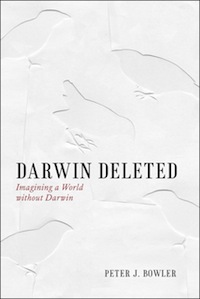 Culture & Ethics
Culture & Ethics
 Evolution
Evolution
Rescuing Darwin: Another Major Problem with Peter Bowler’s Counterfactual History
 In his new book Darwin Deleted: Imagining a World without Darwin (University of Chicago Press), Peter Bowler tries to explode the claim that Darwinism had any causal power in contributing to militarism, racism, eugenics, imperialism, or to Nazi atrocities. Yesterday I examined Bowler’s predilection for calling just about everyone non-Darwinian in the late nineteenth and early twentieth centuries, even if they believed in evolution through natural selection (which in my view is a reasonable definition of Darwinism).
In his new book Darwin Deleted: Imagining a World without Darwin (University of Chicago Press), Peter Bowler tries to explode the claim that Darwinism had any causal power in contributing to militarism, racism, eugenics, imperialism, or to Nazi atrocities. Yesterday I examined Bowler’s predilection for calling just about everyone non-Darwinian in the late nineteenth and early twentieth centuries, even if they believed in evolution through natural selection (which in my view is a reasonable definition of Darwinism).
Now I want to examine another major problem with Bowler’s counterfactual history. He seems to think that if he can find other historical developments antecedent to or independent of Darwinism that contributed to militarism, racism, imperialism, or Nazi ideology, then Darwinism could not have been a significant causal factor influencing these developments. Bowler is certainly correct to point out that many of the currents taken up by social Darwinists in the late nineteenth century were present in European thought and culture before Darwinism and independently of it. Racism, imperialism, and militarism have a long history before Darwinism. Wars would have been fought, land would have been conquered, and people would have been killed with or without Darwinism. It has been happening since time immemorial. Why blame Darwin or Darwinism?
I also agree with Bowler that Darwin (and other evolutionary theorists in the nineteenth century) incorporated many of these endemic trends — racism, imperialism, militarism — into their scientific theories. However, interestingly, this point seems to me to count against Bowler’s argument. By incorporating racism and even human “racial extinction” into his theory of human evolution in The Descent of Man, Darwin not only drew on extant ideas about race, but he promoted them and gave scientific sanction to them. That was important in a society that considered the words “science” and “truth” as synonyms. Bowler does not consider this a serious problem, however, because he persistently underestimates the influence Darwin had on European thought (and not just biology).
But what if Darwin had never written a single line about human evolution or human races (if I may be allowed to do some of my own counterfactual history here)? Would that mean that Darwinism could not have had any influence whatsoever on racism? No, it doesn’t, because it would depend on what other Darwinists coming after Darwin taught. My own scholarship has not been fixated on what Darwin believed (though that is one element among many), but has looked at what many leading Darwinists believed and preached. Most of my own work focused on German Darwinists. I also look not only at what Darwinian biologists said about race, for instance, but what Darwinian-inspired anthropologists, ethnologists, sociologists, philosophers, and physicians wrote about race. What I showed in From Darwin to Hitler was that many German Darwinists used Darwinism not only to explain racial inequality and racial competition, but also to argue that the extermination of the so-called inferior races is a beneficial part of the evolutionary process, precisely because it is part of natural selection (thus they believed in Darwinian selection).
To show Bowler’s fallacious logic, let me give a different historical example. Would it be fair to say that Marxism had no causal effect on Stalin and his atrocities? After all, Marx never taught exactly what Stalin did. We can also discover many economic, social, personal, and even intellectual influences on Stalin that did not come from Marx. Finally, not all Marxists agreed with Stalin, but Marxism produced many conflicting interpretations and directions. Thus, Marxism had no effect on Stalin’s atrocities. This is equivalent to Bowler’s reasoning about the causal role of Darwinism in history. Now I recognize that some Marxist historians do indeed try to distance Marx from his followers, such as Stalin, Mao, Pol Pot, and others. However, those of us who are not Marxists have little reason to “rescue” Marx from the aftereffects of his theory by denying the obvious historical connections that exist. In the same way, we should not deny the obvious historical connections between Darwinism and other historical events, no matter how unsavory they may be.
Richard Weikart is professor of history at California State University, Stanislaus, and author of From Darwin to Hitler: Evolutionary Ethics, Eugenics, and Racism in Germany, and Hitler’s Ethic: The Nazi Pursuit of Evolutionary Progress.
